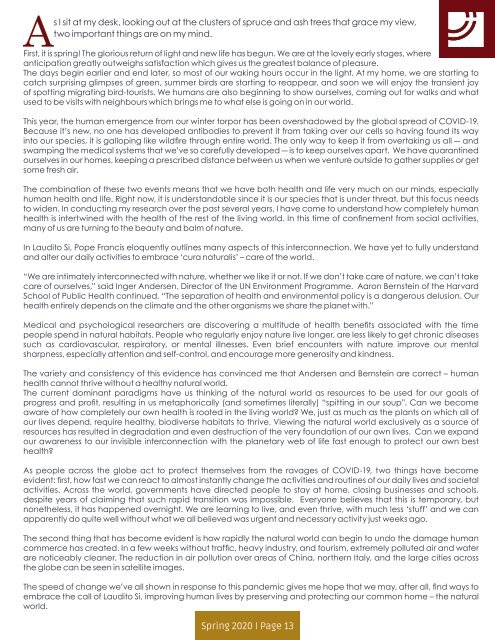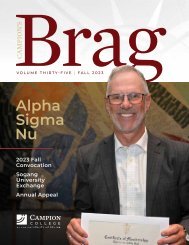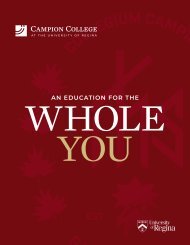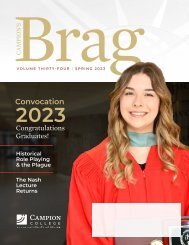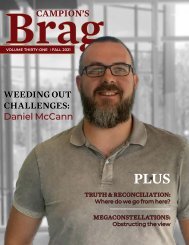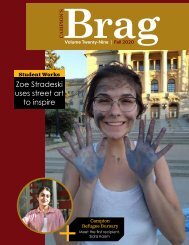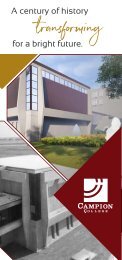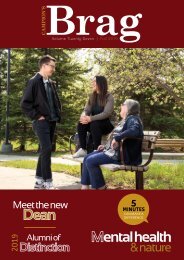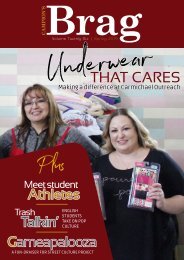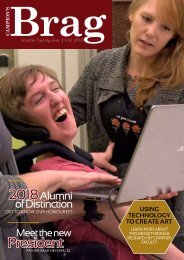Brag-Spring2020
You also want an ePaper? Increase the reach of your titles
YUMPU automatically turns print PDFs into web optimized ePapers that Google loves.
As I sit at my desk, looking out at the clusters of spruce and ash trees that grace my view,<br />
two important things are on my mind.<br />
First, it is spring! The glorious return of light and new life has begun. We are at the lovely early stages, where<br />
anticipation greatly outweighs satisfaction which gives us the greatest balance of pleasure.<br />
The days begin earlier and end later, so most of our waking hours occur in the light. At my home, we are starting to<br />
catch surprising glimpses of green, summer birds are starting to reappear, and soon we will enjoy the transient joy<br />
of spotting migrating bird-tourists. We humans are also beginning to show ourselves, coming out for walks and what<br />
used to be visits with neighbours which brings me to what else is going on in our world.<br />
This year, the human emergence from our winter torpor has been overshadowed by the global spread of COVID-19.<br />
Because it’s new, no one has developed antibodies to prevent it from taking over our cells so having found its way<br />
into our species, it is galloping like wildfire through entire world. The only way to keep it from overtaking us all ― and<br />
swamping the medical systems that we’ve so carefully developed ― is to keep ourselves apart. We have quarantined<br />
ourselves in our homes, keeping a prescribed distance between us when we venture outside to gather supplies or get<br />
some fresh air.<br />
The combination of these two events means that we have both health and life very much on our minds, especially<br />
human health and life. Right now, it is understandable since it is our species that is under threat, but this focus needs<br />
to widen. In conducting my research over the past several years, I have come to understand how completely human<br />
health is intertwined with the health of the rest of the living world. In this time of confinement from social activities,<br />
many of us are turning to the beauty and balm of nature.<br />
In Laudito Si, Pope Francis eloquently outlines many aspects of this interconnection. We have yet to fully understand<br />
and alter our daily activities to embrace ‘cura naturalis’ – care of the world.<br />
“We are intimately interconnected with nature, whether we like it or not. If we don’t take care of nature, we can’t take<br />
care of ourselves,” said Inger Andersen, Director of the UN Environment Programme. Aaron Bernstein of the Harvard<br />
School of Public Health continued, “The separation of health and environmental policy is a dangerous delusion. Our<br />
health entirely depends on the climate and the other organisms we share the planet with.”<br />
Medical and psychological researchers are discovering a multitude of health benefits associated with the time<br />
people spend in natural habitats. People who regularly enjoy nature live longer, are less likely to get chronic diseases<br />
such as cardiovascular, respiratory, or mental illnesses. Even brief encounters with nature improve our mental<br />
sharpness, especially attention and self-control, and encourage more generosity and kindness.<br />
The variety and consistency of this evidence has convinced me that Andersen and Bernstein are correct – human<br />
health cannot thrive without a healthy natural world.<br />
The current dominant paradigms have us thinking of the natural world as resources to be used for our goals of<br />
progress and profit, resulting in us metaphorically (and sometimes literally) “spitting in our soup”. Can we become<br />
aware of how completely our own health is rooted in the living world? We, just as much as the plants on which all of<br />
our lives depend, require healthy, biodiverse habitats to thrive. Viewing the natural world exclusively as a source of<br />
resources has resulted in degradation and even destruction of the very foundation of our own lives. Can we expand<br />
our awareness to our invisible interconnection with the planetary web of life fast enough to protect our own best<br />
health?<br />
As people across the globe act to protect themselves from the ravages of COVID-19, two things have become<br />
evident: first, how fast we can react to almost instantly change the activities and routines of our daily lives and societal<br />
activities. Across the world, governments have directed people to stay at home, closing businesses and schools,<br />
despite years of claiming that such rapid transition was impossible. Everyone believes that this is temporary, but<br />
nonetheless, it has happened overnight. We are learning to live, and even thrive, with much less ‘stuff’ and we can<br />
apparently do quite well without what we all believed was urgent and necessary activity just weeks ago.<br />
The second thing that has become evident is how rapidly the natural world can begin to undo the damage human<br />
commerce has created. In a few weeks without traffic, heavy industry, and tourism, extremely polluted air and water<br />
are noticeably cleaner. The reduction in air pollution over areas of China, northern Italy, and the large cities across<br />
the globe can be seen in satellite images.<br />
The speed of change we’ve all shown in response to this pandemic gives me hope that we may, after all, find ways to<br />
embrace the call of Laudito Si, improving human lives by preserving and protecting our common home – the natural<br />
world.<br />
Spring 2020 І Page 13


